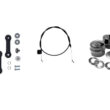Did you know that the average person gets a new car every eight years? But what if you could make your car last longer and avoid a premature new purchase? Here are some proven tips to help you prolong the life of your car:
By following these simple yet effective tips, you can prolong the life of your car and save money in the long run. So take good care of your ride and enjoy the road ahead!
Length of Car Ownership
As a car blogger, I have interacted with many car owners who ask how often they should purchase a new vehicle. According to research, the average lifespan of a car is eight years. This means that a typical car owner should consider replacing their car after eight years of use. However, this doesn’t mean that your car will last for only eight years. With proper maintenance and care, your car can serve you for many more years.
Factors Affecting Car Longevity
The lifespan of a car depends on several factors, including the make and model of the car, driving conditions, and how well the car is maintained. Cars that are well-built and designed to last typically have a longer lifespan than those with fewer features, technological advancements, and durable materials.
Driving conditions also play a significant role in determining the lifespan of a car. For instance, cars that drive on rough terrain, hilly areas, and areas with harsh weather conditions will experience more wear and tear than those driven on smooth roads and good weather.
Finally, how well you take care of your car determines how long it will last. Regular maintenance and timely repairs can extend the life of your car, while neglecting maintenance can lead to the breakdown of the car’s parts, leading to costly repairs or total breakdown.
Importance of Regular Maintenance
As a car blogger, I cannot stress enough on the importance of regular maintenance in extending the life of your car. Regular maintenance of your vehicle involves checking, cleaning, and repairing vital parts of your car. This includes checking engine oil levels, brake pads, and tyres, replacing air filters, and cleaning the car’s interior and exterior.
Regular maintenance not only prolongs the life of the car but also ensures that it is safe to drive. A well-maintained car will have better fuel efficiency, fewer emissions, and perform better than a poorly-maintained one.
Regular maintenance tips:
- Get regular oil changes
- Check tyre pressure and replace tyres when necessary
- Get regular tune-ups
- Change brake pads before they are completely worn out
- Replace air filters and other filters
- Keep your car clean inside and outside
Remember: A well-maintained car will save you money in the long run by reducing the need for repairs, which can be costly.
Signs that Indicate a Need for Replacement
While regular maintenance can increase the lifespan of your car, there comes a time when you need to replace your car. Some signs include frequent breakdowns, a significant reduction in the car’s performance, or when the cost of repairs exceeds the value of the car.
Another sign that it’s time to replace your car is when it no longer meets your needs. For instance, if you need a car with more cargo space, better fuel efficiency, or more safety features.
Tip: Before purchasing a new car, consider the cost of ownership in terms of fuel costs, insurance, and maintenance costs.
Tips for Extending the Life of Your Car
Apart from regular maintenance, there are several measures you can take to extend the life of your car. Some of these include:
- Avoid hard braking and acceleration
- Stay within the speed limit
- Avoid overloading your car with excess baggage or passengers
- Store your car in a sheltered place to protect it from harsh weather conditions
- Follow the manufacturer’s recommendations for maintenance and service intervals
- Use high-quality replacement parts that meet the manufacturer’s specifications
Car Trade-in and Resale Value
When it’s time to replace your car, you can opt to trade-in or sell it. The value of your car when trading in or selling depends on several factors, including the car’s condition, mileage, age, and demand for that particular model.
The resale value of your car is influenced by how well you have maintained and cared for your car. A well-maintained car will have a higher resale value than one that has been poorly maintained.
Advancements in Car Technology
Advancements in car technology have led to the introduction of more durable and efficient car parts. Cars are built with corrosion-resistant materials, better suspension systems, and more advanced features such as automatic braking systems, adaptive cruise control, and lane departure warning systems.
These technological advancements have led to increased longevity of cars, saving car owners money on costly repairs and reducing the need to replace their cars often.
Future of Car Ownership Patterns
The future of car ownership patterns is increasingly moving towards shared mobility and electric cars. Shared mobility, such as ride-sharing services, has led to a decrease in car ownership among millennials and GenZ, meaning cars are driven for shorter periods, increasing the longevity of individual cars.
The future also belongs to electric cars, which are more efficient and have fewer moving parts than gasoline-powered cars. Electric cars offer longer lifespans with fewer maintenance needs, saving car owners money in the long run.
In conclusion, the lifespan of a car depends on several factors, including regular maintenance, driving conditions, and car make and model. Regular maintenance is essential in extending the life of your car, and you should be aware of the signs indicating the need for replacement. Finally, car technology is advancing, and the future of car ownership patterns favors electric and shared mobility cars.



